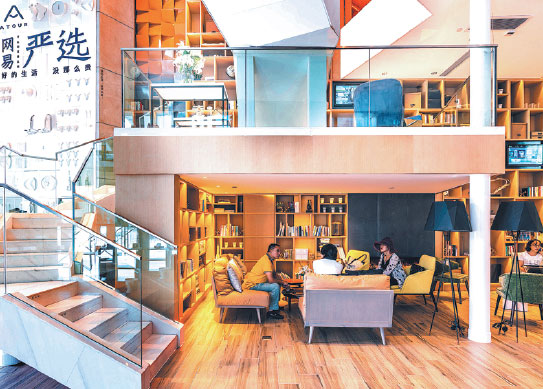\Generation Y’s taste for premium interior designs for their homes is affecting their choice in hotels while traveling – bringing opportunities and challenges to a hospitality industry that wants to woo the expanding Chinese middle class.
“This house is cheaper and located next to the (French river) Seine, but I don’t like its European-styled oxblood-colored furniture, which makes the room seem dim and depressing to me,” said Chen Xinyi.
The 25 year-old office worker made her remarks while going through the options listed on house sharing site Airbnb for her trip in France during the Golden Week holiday.

“I would like to stay in this modern studio in Montmartre area, the art center of Paris to match my own aura, even if the price is double,” she said.
Her face instantly lit up when she spotted a designer lounge made of glass and timber in a two-bedroom apartment, costing almost $250 per night.
Chen and two other friends – who work in financial technology and a government bureau respectively – put up a total of $3,000 or so for their hotel budget for their 10-day stay in Europe.
Their booking list included a modern loft, a minimalistic timber hotel and a black and white-themed designer apartment with a glass-roof lounge, as well as a matte-black jacuzzi on the terrace.
“I don’t mind spending a little more since it’s the longest holiday in the year for me and I would very much like to stay in a place that can show my identity, my taste and who I want to be,” Chen said.
Such preferences have sparkled innovation for Airbnb hosts wanting to attract more custom, bigger when they rent out their house on the online platform.
“Younger people nowadays have different tastes than previous generations, shaped by their experiences traveling, studying and even working in various places around the world, “said Xu Yuanyuan, a 30-year-old Shanghai-based business owner who has also been an Airbnb landlord for two years.
Xu was deeply impressed by the comfortable apartments and houses she stayed at and the nice hosts she met during her wedding trip to Europe in the summer of 2015.
She made up her mind to do the same thing once she returned to Shanghai and renovated her own house, inspired by the former French Concession in downtown Shanghai.
Being a world traveler, she knew what young people were looking for – not just superficial decorations trying to turn a room into an exotic experience, but a truly comfortable living space.
“I carefully look over a building’s architecture, its style, community, facilities and even the stores around it,” Xu said.
It cost between 10,000 yuan ($1,530) and 30,000 yuan to refurbish her place to her satisfaction.
“From time to time, tenants show their appreciation for some of the ingenuity that I put into the room, some of which is quite trivial,” she said.
“But it gives me pride.”
The growing preference for designer hotel and houses rather than star-rated or economy hotel rooms has posed an upgrade challenge for the hospitality sector.
“The middle-ranged hotels are facing potential crisis as the economy motels are no longer good enough to meet the demands of the young middle class, “said Yelv Yin, founder of Atour Group, a premier hotel brand targeting the younger generation.
Yin was one of the co-founders of Hanting and Home Inns, two popular economy hotels in China.
In 2013 Atour launched its first hotel in Xi’an, which had rooms decorated with award-winning photographs from around the world. Photography and travel lovers can experience something of being on the road in their rooms.
Over the years the group has expanded to many cities, growing its portfolio to over 100 hotels, all with different themes.
“To live in a hotel does not mean just staying somewhere else, but it’s part of your life experience,” Yelv added.


